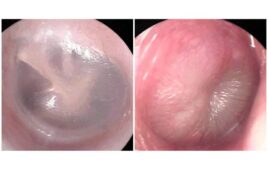Kevin Leiser starts with his eyes closed and his back to the target. As he turns and raises the compound bow, he keeps his eyes shut, listening to the beeping in his headphones. He adjusts his aim until the beeps merge into a solid tone that comes through evenly in both ears. He draws back an arrow, makes a few final adjustments, and fires.
Leiser, a fifth-year student studying electrical engineering at Northeastern, usually shoots with his eyes open. But he has spent the past two semesters working with a team of his peers to build a system that would enable visually-impaired individuals to aim and fire a bow on their own.
“We wanted to make a device that enables blind archery shooters to shoot with some sense of accuracy, while also giving them some sense of independence while they do it,” says Leiser.
The device was just one of the projects displayed by undergraduates in Northeastern’s Enabling Engineering student group at the annual showcase earlier this month. Students in the group work to design and build devices to improve the lives of people with physical and cognitive disabilities.
“We’re really focused on connection with our clients,” says Waleed Meleis, an associate professor and associate chair of electrical and computer engineering who advises the group. “We don’t just build something in a vacuum.”
Other projects included a modified exercise device that will play music when students use it, encouraging them to keep pedaling; a clamp to help a woman with muscular dystrophy put her hair into a ponytail with one hand; and a sensory tray with interesting objects that can be attached to a wheelchair to keep with the attention of a client with cognitive disabilities.
“You have to be really creative,” says Alex Rivas, a fifth-year student studying bioengineering. “It’s always daunting at first—Where are you going to begin?—but I think that’s part of the fun.”
Rivas has been working on a project to design a more comfortable physical therapy harness for individuals who need to practice using their legs, but can’t walk without assistance. Starting with a climbing harness and a tactical vest, the group has experimented with different configurations and padding to make something that is comfortable and adjustable for different patients.
While many of the students involved in Enabling Engineering are engineers, the group draws students from across disciplines and areas of study. Rachel Biega, a third-year physical therapy student, lent her knowledge to the harness project, along with another bioengineer.
“Being on an interdisciplinary team, working with engineers, that’s really cool and rewarding,” Biega says. “I get to hear their side and listen to their lingo, and then they can learn a little bit about PT at the same time.”
Students work through the design process together, with guidance from professors and professionals in the Boston area and around the country. Sometimes it takes several tries to get a project to work; students may have to make small design adjustments or start over from scratch.
“There’s no solution that you’re guided to,” says Amanda Haines, a third-year mechanical engineering student. “You’re just given a problem and then you have to run with it from there.”
Haines and her group took over on a project to build a device that would enable their client to learn to play guitar with one hand. The original prototypes, which were designed to hold down the strings in different chord shapes while the client strummed, hadn’t been successful.
The group went back to the drawing board. Sam Baumgartel, a third-year electrical engineering student who happens to play guitar, suggested flipping the design and building something that would handle the strumming, instead of chords.
So far, their new design seems to be working. The client will be able to control the strumming with a foot pedal and hold the chords with his hand. The group hopes to have a final product in time for him to start guitar lessons in the fall.
“Fail early and fail hard: that’s a really important lesson that this club teaches very well,” Baumgartel says. “It’s not something that anyone will teach you in a class.”




